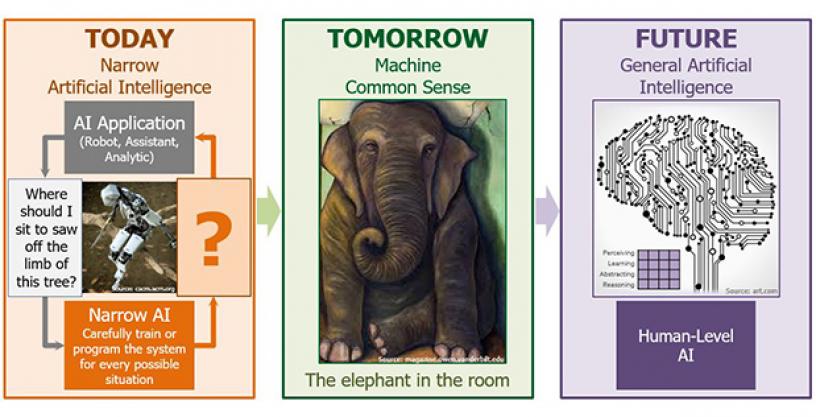DARPA program seeks to articulate and encode humans’ basic background knowledge for intelligent systems

Oct 11, 2018
Today’s machine learning systems are more advanced than ever, capable of automating increasingly complex tasks and serving as a critical tool for human operators. Despite recent advances, however, a critical component of Artificial Intelligence (AI) remains just out of reach – machine common sense. Defined as “the basic ability to perceive, understand, and judge things that are shared by nearly all people and can be reasonably expected of nearly all people without need for debate,” common sense forms a critical foundation for how humans interact with the world around them. Possessing this essential background knowledge could significantly advance the symbiotic partnership between humans and machines. But articulating and encoding this obscure-but-pervasive capability is no easy feat.
“The absence of common sense prevents an intelligent system from understanding its world, communicating naturally with people, behaving reasonably in unforeseen situations, and learning from new experiences,” said Dave Gunning, a program manager in DARPA’s Information Innovation Office (I2O). “This absence is perhaps the most significant barrier between the narrowly focused AI applications we have today and the more general AI applications we would like to create in the future.”
The exploration of machine common sense is not a new field. Since the early days of AI, researchers have pursued a variety of efforts to develop logic-based approaches to common sense knowledge and reasoning, as well as means of extracting and collecting commonsense knowledge from the Web. While these efforts have produced useful results, their brittleness and lack of semantic understanding have prevented the creation of a widely applicable common sense capability.
In recent years, significant progress in AI along a number of dimensions has made it possible to address this difficult challenge today. DARPA has created the Machine Common Sense (MCS) program to develop new capabilities. MCS will explore recent advances in cognitive understanding, natural language processing, deep learning, and other areas of AI research to find answers to the common sense problem.
To focus this new effort, MCS will pursue two approaches for developing and evaluating different machine common sense services. The first approach will create computational models that learn from experience and mimic the core domains of cognition as defined by developmental psychology. This includes the domains of objects (intuitive physics), places (spatial navigation), and agents (intentional actors). Researchers will seek to develop systems that think and learn as humans do in the very early stages of development, leveraging advances in the field of cognitive development to provide empirical and theoretical guidance.
“During the first few years of life, humans acquire the fundamental building blocks of intelligence and common sense,” said Gunning. “Developmental psychologists have founds ways to map these cognitive capabilities across the developmental stages of a human’s early life, providing researchers with a set of targets and a strategy to mimic for developing a new foundation for machine common sense.”
To assess the progress and success of the first strategy’s computational models, researchers will explore developmental psychology research studies and literature to create evaluation criteria. DARPA will use the resulting set of cognitive development milestones to determine how well the models are able to learn against three levels of performance – prediction/expectation, experience learning, and problem solving.
The second MCS approach will construct a common sense knowledge repository capable of answering natural language and image-based queries about common sense phenomena by reading from the Web. DARPA expects that researchers will use a combination of manual construction, information extraction, machine learning, crowdsourcing techniques, and other computational approaches to develop the repository. The resulting capability will be measured against the Allen Institute for Artificial Intelligence (AI2) Common Sense benchmark tests, which are constructed through an extensive crowdsourcing process to represent and measure the broad commonsense knowledge of an average adult.
Interested proposers have an opportunity to learn more about the Machine Common Sense program during a Proposers Day, scheduled for Thursday, October 18, 2018 from 9:00am-1:00pm ET at the DARPA Conference Center, located at 675 N. Randolph St., Arlington, Virginia, 22203. For additional information, visit:
A full description of the program will be made available in a forthcoming Broad Agency Announcement.
Image Caption: The Machine Common Sense (MCS) program seeks to address the challenge of articulating and encoding human common sense reasoning for intelligent machines. The MCS program will aim to create machine common sense services that can help break down the barrier between the narrowly focused AI applications of today and the more general AI applications of the future.
# # #
Media with inquiries should contact DARPA Public Affairs at outreach@darpa.mil
Associated images posted on www.darpa.mil and video posted at www.youtube.com/darpatv may be reused according to the terms of the DARPA User Agreement, available here: http://go.usa.gov/cuTXR.
Tweet @darpa
